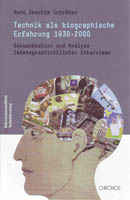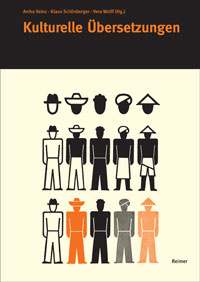CATaC'06-Konferenz: Cultural Attitudes towards Technology and Communcication
Die CATaC'06 - Cultural Attitudes towards Technology and Communcication findet dieses Jahr (28.6.-01.07 2006) in Tartu (Esland) statt. Der Titel der Konferenz lautet: "Neither global village nor homogenizing commodification: diverse cultural, ethnic, gender and economic environments"
Das Forschungskolleg Kulturwissenschaftliche Technikforschung wird am Samstag, 1. Juli durch seinen Koordinator Klaus Schönberger vertreten sein. In der Sektion "8B. Ethics, Justice and Social Change" referiert er zum Thema "Using ICT and socio-cultural change: Persistent and recombinant practices in using weblogs"
Abstract
The connection between socio-cultural change and use of the new media is frequently being conceptualized as a dichotomy of unleashing ["deboundarisation"] and persistence. Based on a discussion of the use of the new media in everyday life by an example of weblogs, the paper suggests a contrasting view. From this perspective, a connection between persistence and recombination of social structuring and social practices can be seen as a model for social change. This model is based on the hypothesis that the use of new media is based on given social structures and social practices. With respect to tendencies like individualization and globalization, the social potential of new media like Weblogs offers distinct forms of media use within different social practices, including the strengthening of the latter as well as doing without them.
Das gesamte Programm zum Download
Conference Co-Chairs
Charles Ess, Drury University, USA
Fay Sudweeks, Murdoch University, Australia
Aus dem Call for Paper
"CATaC’06 continues our focus on the intersections of culture, technology, and communication, beginning with an emphasis on continued critique of the assumptions, categories, methodologies, and theories frequently used to analyse these. At the same time, CATaC’06 takes up our characteristic focus on ethics and justice in the design and deployment of CMC technologies. We particularly focus on developing countries facilitated by “on the ground” approaches in the work of NGOs, governmental agencies, etc., in ways that preserve and foster cultural identity and diversity. By simultaneously critiquing and perhaps complexifying our theories and assumptions, on the one hand, and featuring “best practices” approaches to CMC in development work, on the other hand, CATaC’06 aims towards a middle ground between a putative “global village” and homogenizing commodification. Such middle ground fosters cultural diversity, economic and social development, and more successful cross-cultural communication online."
Zur Geschichte der catac-Konferenzen
" The biennial conference series on Cultural Attitudes towards Technology and Communication provides one of the most significant international forums for research on how diverse culture attitudes and communication preferences shape the implementation and use of information and communication technologies. The conference series brings together scholars from around the globe who provide diverse perspectives, both in terms of the specific culture(s) they highlight in their presentations and discussions, and in terms of the discipline(s) through which they approach the conference themes.
The first conference in the series was held in London, UK, in 1998; the second conference in Perth, Australia, in 2000; the third conference in Montreal, Canada, in 2002; and the fourth in Karlstad, Sweden, in 2004."
Das Forschungskolleg Kulturwissenschaftliche Technikforschung wird am Samstag, 1. Juli durch seinen Koordinator Klaus Schönberger vertreten sein. In der Sektion "8B. Ethics, Justice and Social Change" referiert er zum Thema "Using ICT and socio-cultural change: Persistent and recombinant practices in using weblogs"
Abstract
The connection between socio-cultural change and use of the new media is frequently being conceptualized as a dichotomy of unleashing ["deboundarisation"] and persistence. Based on a discussion of the use of the new media in everyday life by an example of weblogs, the paper suggests a contrasting view. From this perspective, a connection between persistence and recombination of social structuring and social practices can be seen as a model for social change. This model is based on the hypothesis that the use of new media is based on given social structures and social practices. With respect to tendencies like individualization and globalization, the social potential of new media like Weblogs offers distinct forms of media use within different social practices, including the strengthening of the latter as well as doing without them.
Das gesamte Programm zum Download
Conference Co-Chairs
Charles Ess, Drury University, USA
Fay Sudweeks, Murdoch University, Australia
Aus dem Call for Paper
"CATaC’06 continues our focus on the intersections of culture, technology, and communication, beginning with an emphasis on continued critique of the assumptions, categories, methodologies, and theories frequently used to analyse these. At the same time, CATaC’06 takes up our characteristic focus on ethics and justice in the design and deployment of CMC technologies. We particularly focus on developing countries facilitated by “on the ground” approaches in the work of NGOs, governmental agencies, etc., in ways that preserve and foster cultural identity and diversity. By simultaneously critiquing and perhaps complexifying our theories and assumptions, on the one hand, and featuring “best practices” approaches to CMC in development work, on the other hand, CATaC’06 aims towards a middle ground between a putative “global village” and homogenizing commodification. Such middle ground fosters cultural diversity, economic and social development, and more successful cross-cultural communication online."
Zur Geschichte der catac-Konferenzen
" The biennial conference series on Cultural Attitudes towards Technology and Communication provides one of the most significant international forums for research on how diverse culture attitudes and communication preferences shape the implementation and use of information and communication technologies. The conference series brings together scholars from around the globe who provide diverse perspectives, both in terms of the specific culture(s) they highlight in their presentations and discussions, and in terms of the discipline(s) through which they approach the conference themes.
The first conference in the series was held in London, UK, in 1998; the second conference in Perth, Australia, in 2000; the third conference in Montreal, Canada, in 2002; and the fourth in Karlstad, Sweden, in 2004."
TK-Kolleg - 24. Jun, 09:59
















Trackback URL:
https://technikforschung.twoday.net/stories/2221939/modTrackback